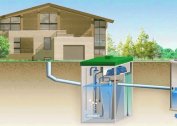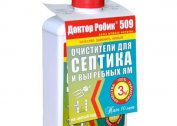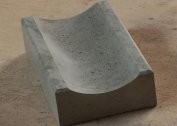The sewer system in houses and apartments is periodically clogged. The reason for this is most often the fat deposits formed on the pipes. If they are not removed, then the drain hole will completely clog, the water will cease to leave and an unpleasant odor will appear. Fat deposits are effectively eliminated by mechanical and improvised means, as well as special preparations. To prevent re-clogging of the pipes, a number of preventive measures must be observed.
Why is fat accumulating and how dangerous is it
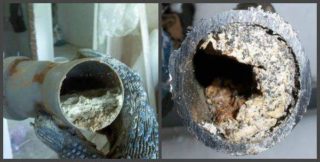 Over time, fat deposits form in the sewer system. Fat enters the pipes mainly with food debris when washing dishes. Pouring meat broths, soups, gravy, butter, on which food was cooked into the sink, also contributes to blockages. Subsequently, small debris, dirt, household waste sticks to the fat deposits in the pipes, they are compacted and become impassable. As a result, the water from the sink drains very slowly or does not leave at all.
Over time, fat deposits form in the sewer system. Fat enters the pipes mainly with food debris when washing dishes. Pouring meat broths, soups, gravy, butter, on which food was cooked into the sink, also contributes to blockages. Subsequently, small debris, dirt, household waste sticks to the fat deposits in the pipes, they are compacted and become impassable. As a result, the water from the sink drains very slowly or does not leave at all.
Clogged pipes not only in the kitchen, but also in the bathroom. This is due to the discharge of residues of fatty foods into the toilet. Sewer drain ceases to function normally until it is cleaned. The risk of tight blockages increases if the installation of the sewer system was made with violations. Most often this happens when the angle of the pipes is set incorrectly.
Fat deposits not only interfere with the normal functioning of the sewer system, but also create a favorable environment in the pipes for the formation of molds and dangerous microbes. Over time, a persistent unpleasant odor of hydrogen sulfide and rot appears from the drain hole.
Cleaning methods
It is necessary to get rid of fat blockages in sewer pipes. There are several proven methods for this.
Tools at hand
Remove fat deposits in the pipes using safe and effective folk remedies.
Soda
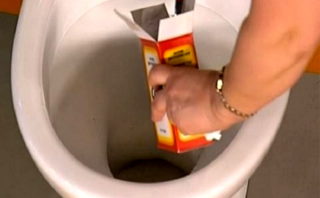 Pour a glass of product into the sink, bath or toilet bowl. Pour hot water and leave for a couple of hours. In this case, the hole in the sink and bath must be tightly closed with a stopper. The toilet should be covered with a lid.
Pour a glass of product into the sink, bath or toilet bowl. Pour hot water and leave for a couple of hours. In this case, the hole in the sink and bath must be tightly closed with a stopper. The toilet should be covered with a lid.
Vinegar with soda
It is much more effective to clean the blockage with soda and vinegar. In addition, citric acid may be added. The alkali should be filled in a sink or toilet bowl and pour table vinegar. A chemical reaction will occur, resulting in the quenching of sodium bicarbonate. At the same time, the carbon dioxide emitted promotes the pushing of blockages in the pipes, and soda with vinegar and citric acid dissolves fat.
Salt
It is necessary to prepare a saline solution. To do this, you need to dissolve five tablespoons of salt in a liter of warm water. Pour the prepared solution into the drain hole and leave for three hours. Rinse the pipes with hot water after exposure. Salt will dissolve body fat and destroy bad breath. This method is suitable for frequent use.
Coca Cola
The drink contains phosphoric acid, which dissolves fat deposits well. For exposure to Coca-Cola, you need to pour it into the toilet or sink and leave it overnight. In the morning, flush the sewer system with hot water. Instead of Coca-Cola, you can also use a sprite.
Special preparations
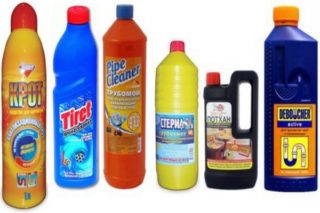 If improvised means do not cope with blockages, it is necessary to use chemicals. They are made in the form of powders, liquids, tablets and gels. The composition of chemicals includes alkali or acid, so they effectively eliminate fatty pollution in the pipes.
If improvised means do not cope with blockages, it is necessary to use chemicals. They are made in the form of powders, liquids, tablets and gels. The composition of chemicals includes alkali or acid, so they effectively eliminate fatty pollution in the pipes.
Mister Muscle
Available in the form of a gel or granules. Effective for 20 minutes.After applying the pipe, rinse with a stream of hot water. The tool is very corrosive, so you need to work with it in rubber gloves.
Mole
A very popular, effective and inexpensive means for cleaning the sewer system. It is made in the form of powder and liquid. Destroys microbes and molds. Order of use: pour or pour into a pipe and leave for exposure for several hours. Then rinse the pipes well with hot water.
Tiret turbo
It is made in the form of a thick gel. Penetrates fat even in stagnant water and dissolves them effectively. Suitable for cleaning not only plastic pipes, but also metal ones. The tool also has a disinfecting effect, eliminates unpleasant odors. For exposure, the gel must be poured into the drain hole of the sink and left for five minutes. After this, the pipe should be washed with plenty of water.
Bagi Pothan
Strong and effective chemical agent. In a few minutes it removes body fat and other impurities. When using the product, it is necessary to wear rubber gloves and open the windows. After exposure, rinse the pipes with a stream of hot water.
Mechanical means
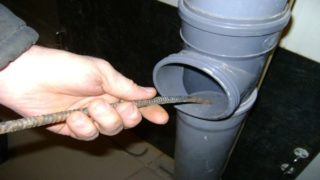 Clogs formed in the sewer system can be cleaned by mechanical means. One of these is the plunger. It must be attached to the drain hole so that the rubber valve fits snugly against the sink. Perform translational movements without lifting the device from the surface. Under the influence of pressure injected by the plunger, the grease plug will quickly collapse and the sewer pipes will be cleaned.
Clogs formed in the sewer system can be cleaned by mechanical means. One of these is the plunger. It must be attached to the drain hole so that the rubber valve fits snugly against the sink. Perform translational movements without lifting the device from the surface. Under the influence of pressure injected by the plunger, the grease plug will quickly collapse and the sewer pipes will be cleaned.
If the blockage is too dense and localized deep in the sewer system, you should use a plumbing cable. The device consists of a long flexible metal wire with a brush on the end and a handle. Sometimes the tip is a stretched stiff spring.
Using rotational movements, the plumbing cable is screwed into the body fat like a corkscrew. In this case, the blockage is destroyed, and the pipes inside are cleaned. On the working surface of the cable extracted from the sewer system, there are residual grease and debris that must be removed. After cleaning, rinse the device with hot water and grease with machine oil.
Prevention and Prevention of a Problem
It is possible to prevent the occurrence of fatty deposits in the pipes if a number of preventive measures are performed, namely:
- Periodically turn on the tap with hot water only. Five minutes is enough to wash off the adhering grease from the walls of the sewer pipes.
- Install nets on the sinks that trap food debris and debris.
- If there is such a possibility, then sometimes disassemble the pipes and rinse them.
- Wash dishes after fatty foods only with warm water using detergents that dissolve fat.
- When installing the sewer system, be sure to consider the angle of inclination and the diameter of the pipes.
- Do not flush food debris containing fat into the toilet or sink. It is better to collect them in an unnecessary container and throw them in a garbage container.
- Flush the sewer system periodically with a solution of soda or vinegar. If the blockages are tight, then chemical agents can be used.
Compliance with preventive recommendations helps prevent the negative consequences associated with clogging of the pipes with fatty deposits. Failure to carry out measures entails a series of measures aimed at a comprehensive cleaning of the sewer system.
